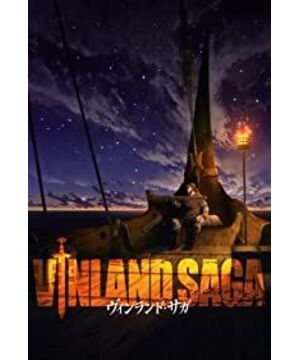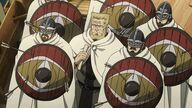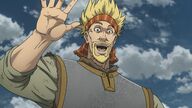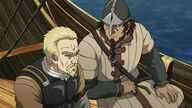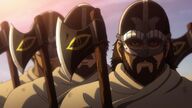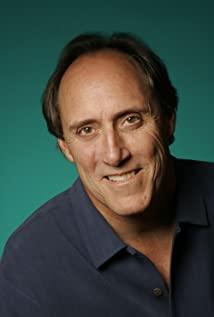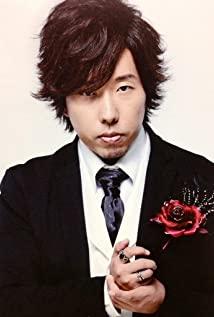I don't need to say more about the level of the original work, otherwise it would not have been hot for so many years. But the plot of the original was very anti-commercial.
At the beginning, I gave 2 stars to express "not recommended", especially not recommended to general anime fans, but many people misunderstood me that I was looking down on this work. I have a high evaluation of this work, but I feel that the plot deviates too far from the values of ordinary people, which leads to serious commercial problems. Similarly, I don't recommend "In This Corner of the World". People who like it will naturally watch it, and ordinary people will fry the pan after watching it.
The main problem is that the protagonist's behavior makes the reader unable to empathize. Let's connect the protagonist's experience and see it like this:
1 When his childhood father was killed, he became the enemy's subordinate in order to seek revenge.
2 He followed his enemies to burn, kill and loot, killing many good people.
3 When he met a good friend, the friend persuaded the enemy to end the troubled times with him, and the enemy was whitewashed.
4 The enemy dies, the protagonist has a mental breakdown, becomes a slave, and goes to the farm to farm.
5 Witnessed the oppression of slaves by slave owners on the farm, awakened to pacifism and vowed not to use violence again.
6 When Jiyou came to attack the farm and was about to win a big victory, the male protagonist stood up and persuaded Jiyou to give up. The slave owner retreated completely, and most of the good people died.
7 The protagonist forms a team, collects resources everywhere, and prepares to cross the sea to find a paradise on earth without violence.
The biggest problem is the second stage. In the childhood plot, he wanted to sneak up on the sleeping enemy, thinking that it would be disgraceful to do so, and gave up (I forgot this comic, but the animation did). In the juvenile chapter, he betrayed the mother and daughter who rescued him, so we see a very disgusting contrast in the story: for killing his father's enemy, he follows moral principles, and for a good person who selflessly rescues himself, he retaliates.
There are only two words to describe this level of character building - pathetic.
You can see what the hero said at the time (this is the memory of the second wife, Sister Zhuge). The last person I saw who said this was Zhi Zhixiong.
The male protagonist had already carried a blood debt in the second stage, and then he put down his butcher knife and became a Buddha on the spot. This pivotal episode happened in paragraph 5, and from that point on, I couldn't relate to the author at all. This is not at all the logic of "when will the grievances be repaid", but when the bad people continue to hurt the good people without any reflection, the good people voluntarily give up their resistance. The male protagonist believes that "the cause of the tragedy is the use of violence." According to this logic, the Chinese War of Resistance was wrong, and Gandhi was right.
Don't equate Yukimura's plot with the "mutual understanding" of Japanese animation, the two are essentially different. What Makoto Yukimura wants to express is actually a Christian thought—the world suffers not because of bad people, but because human beings are born sinful, and we are all sinners, so we must forgive and preach love.
In addition to the thematic problems, there are also narrative problems. The rhythm of the story of Pirates of War is the second strangest among the long novels I have read. The first strangest is "The Story of the University of Tokyo", an unprecedented strange book.
There is a classic routine in the literary and art circles, which is repression-release.
The mode of Pirate Wars is: Depression - about to release - change scene - depression - about to release - change scene
At the beginning of each plot of Pirate Wars, either we are the bad guys, or we are suppressed by the bad guys. After a series of plots, the villain is whitewashed + our situation is improved, and then the whitewashed villain dies, repeating the previous process! This series of plots continued until Chapter 3 went to sea, which means that it was repeated 3 times! Just crazy!
"Pirates of War" wrote the script like this, not to be curious, but to express historical facts very seriously. It fully shows the dark details of the ancient society of the jungle that modern people are completely unfamiliar with. The author wants readers to experience complete despair, and only after experiencing this despair can they understand the choices made by the male protagonist behind the story.
But I have to say that Yukimura Makoto's writing is really a bit problematic. There are many deliberately arranged counter-routines in the story. Here we can compare the popular anti-routine work "The Mouth of the Wolf". The characteristic of "The Mouth of the Wolf" is that the righteous side has been beaten by the bad guys all the time, so that readers have Stockholm disease and the villain is the protagonist. But the author of "Mouth of the Wolf" is very shrewd. He knows that no matter what the readers say, they still can't accept the victory of the bad guy, so at the end of the story, let us win a big victory and completely torture the villain to death. How depressing the story is in the early stages, how high-spirited it is in the back. And "Pirates of War" is just the opposite. When the villain fights a good guy, the hero is almost a one-punch superman. When the villain's comrades-in-arms cleans up and needs the hero's help, the hero's combat effectiveness plummets instantly. Later, the male protagonist unlocked the "pacifism" skill, and he was beaten in the face of bad guys and never fought back. It's hard to fight back, and the combat effectiveness is greatly reduced compared to when the bad guy is, and in the end, the good guy is always unlucky. Therefore, "Pirates of War" is not "you are weak and you are unlucky", but "you are a good person and you are unlucky". Although there is nothing too crooked in the three views of the whole work, this narrative disorder makes it impossible for people with normal views to watch it. go down. And the comics that are also dark, "Legend of Sword and Wind" are more in line with the thinking of normal people. Gus can only exert his full strength when he fights for good people.
The adaptation of the animation, from the perspective of the first 3 episodes, not only did not correct the defects of the original work, but amplified the defects. The beginning of the original work is actually relatively simple. It hastily explained the original living environment, and then directly enters the main line. However, the animated version actually spent more than 2 episodes explaining the life of the protagonist before.
I can't understand why the screenwriter did this. In the two previous popular works, it is not necessary to say how awesome the beginning of the giant is. Even the armored city starts with a very simple and crude catastrophe. I won't say that we First spend 2 episodes to introduce the original happy life and then compare it with the scene of Kabane breaking the city.
Here, allow me to use a line from "Youyou Baishu" to evaluate the animated version of "Pirates of War":
"There is one thing that WIT lacks right now - the sense of crisis facing bankruptcy!"
View more about Vinland Saga reviews


